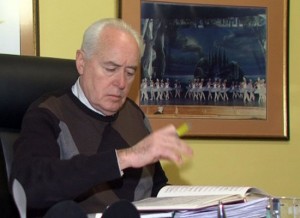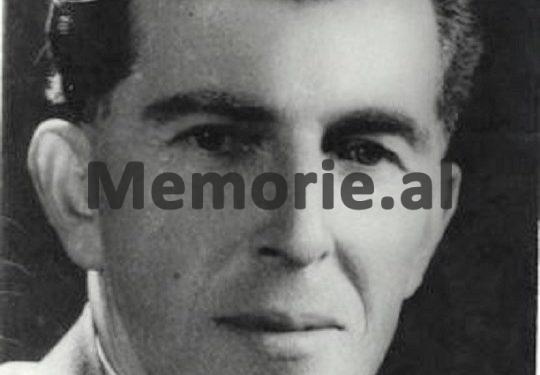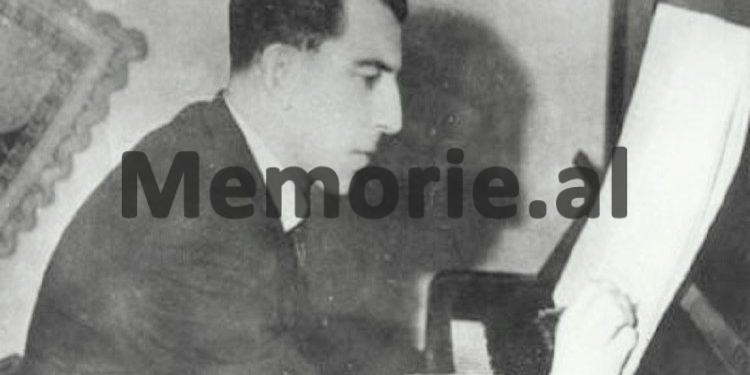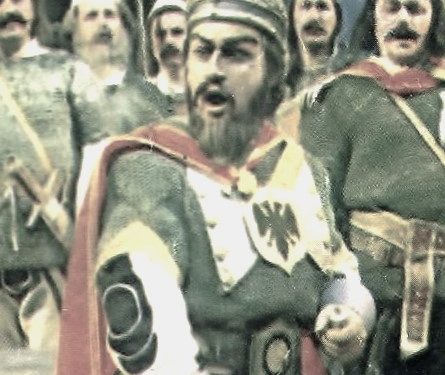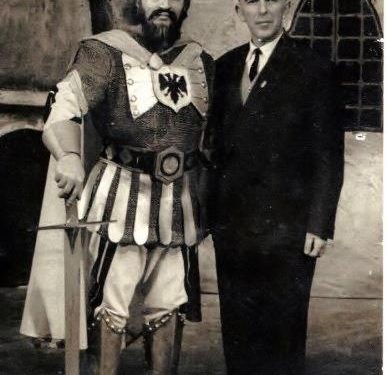Zhani Ciko: How Prenk Jakova killed himself, because of the opera “Skënderbeu”…?!
Memorie.al / It took 44 years for Prenk Jakova’s opera “Skënderbeu” to see the stage light again. On the 100th anniversary of Independence, the National Theatre of Opera and Ballet is bringing this work out of the archive, returning it in a new dimension, adapting it not only to the time but also to the scope and image that Albanians have of the National Hero. What is immediately striking is the fact that this opera had to wait so long to be restaged…! But the opera “Skënderbeu” has a complicated history. Commissioned by order from “above,” it is said that Enver Hoxha himself met Prenk Jakova personally and gave him the order, and the opera was written in record time. All the heads of state came to attend the premiere, and the reception was very cold.
The composer not only received no thanks for the colossal work, but had to face a torrent of criticism, gossip, and finally; a “black” two-page spread in the newspaper Zëri i Popullit (Voice of the People). This was a fatal blow for the composer, who had lived a life full of vicissitudes and persecution, due to the execution of his nationalist brother by the communist dictatorship. The return to Shkodër would be sad for the composer, who only a short time later, in a severe depressive state, ended his life at the age of 52.
Afterwards, the work was forgotten. The topics of the day, featuring workers and cooperativists, flourished, and “Skënderbeu” was covered in dust. 44 years after that distant year of 1968, the director of the National Theatre of Opera and Ballet, maestro Zhani Ciko, who was a young man at the time who had just set foot in the opera house, recounts its history, the reception of the time, the reasons why it was forgotten, and the mega-production that would be staged at the National Theatre of Opera and Ballet in 2012, on the occasion of the 100th anniversary of Independence.
Ciko, why did the opera “Skënderbeu” have to wait 44 years to come to the stage?
It was an obligation to the author, to a work that has a lot of music within it, that pushes you to discover many interesting things, plus it coincides with the 100th anniversary of Independence. For years I have wanted to return to this work, but I knew that it would have its proper time, and this is exactly the year, as “Skënderbeu” remains the first complete historical work in Albanian music, showing a great fresco of a glorious era in our national history.
Why it was not staged later, after all, it was a work about our National Hero…?
I believe the reasons were numerous before. Since the work did not have a great success, it was no longer remembered. At that time, there was more of a preference for the topics of the day. After the 4th Plenum, the orientation was; focusing on the topic of the day, and “Skënderbeu” was considered a closed chapter. Only later, from the mid-’80s, did a work with a legendary theme appear, which was “Plaga e dhjetë e Gjergj Elez Alisë” (The Tenth Wound of Gjergj Elez Alia), but until then, even when the work had a strong literary context, such as “Lumi i vdekur” (The Dead River) or “Gjenerali i ushtrisë së vdekur” (The General of the Dead Army), they were masked behind titles like; “Para stuhisë” (Before the Storm), “Tokë e pamposhtur” (Unconquered Land), meaning the contents of the works were artificially sloganized. But all of these have had their role in the development of Albanian music, which must be considered positive in some cases.
How will this work come to the public in 2012?
We now have the opportunity to treat it in the full breadth that it creates, musically and scenically, with the aim of raising it to the pedestal where it deserves to be, a “grand opera” that, in our vision, approaches all other operas in the world repertoire that feature real historical figures. All the more so that “Skënderbeu” must have been a very attractive character, this is also shown by the fact that after his death, an opera was dedicated to him by Vivaldi. This is a unique case, not only for Albania but for the stage art in general, as Baroque-era works dealt with themes from antiquity or mythology, and there are no cases where they featured real characters.
From here we understand that “Skënderbeu” has radiated throughout Europe, and we will bring this radiance to our work. But we also have the image that Albanians have created after reading Barleti, Noli, and other works, and seeing the monuments of Skënderbeu. And this image we have is not the Vivaldian Europe, where we have the chivalrous adventures of the hero who also has his internal dramas, so a completely different plan. Whereas here we have a Skënderbeu, a character of a national history, which he leads based on some great, heroic, pan-European, pan-Christian principles. All these aspects are felt more in the music than in the words, as the authors protected themselves from continuous attack by the critics of the time, who were only waiting for one word to shut down the opera.
This factor is felt in the religiosity of the work, in choral fragments, in the purpose behind Gjergj Kastrioti’s stances, in some lapidary moments, such as; “The great moment is coming” (I madhi çast po vjen) or, “I did not bring you freedom” (Lirinë nuk ua solla unë), which are also the greatest scenes of the work. The opera provides an opportunity to approach the era and not to leave “Skënderbeu” as he was thought of at that time, as a leader of popular masses who clashed with a regular and organized army of Sultan Murad and defeated it.
This is not true. Skënderbeu’s history involves diplomatic relations with other states and the aspect of organizing a state, with other princes, of an Albanian army that made it possible to win and defeat the armies of Anatolia for years in a row. And all these aspects are part of this mega-production.
So, is it coming back revised?
We have revised it in all those moments where we are allowed, where we can penetrate, to give this context of this “Skënderbeu,” according to our vision, and we hope to present this great fresco of our history, 100 years after the creation of the state and over 400 others, since the time they occurred.
Has this work managed to survive time in terms of the values it carries?
In this new reading, after so many years, from a different position, I find that it has many beautiful pages. Prenka’s other opera, “Mrika,” is highly valued from a musical perspective; this work takes it further. Prenka advanced in his concept of creating the opera, elaborated greatly on the structure, the musical dramaturgy, plus the fact that in every page he composed, especially in the massive arias, he poured a lot of emotion and has a lot of music within.
Why did you choose a foreign director for the restaging of this work?
The choice of the director was compelled by some recent events. We were forced to call Professor Saleti, as he has experience with staging massive works. He is a professor at the Academy of Verona, where the Arena is, where large shows are mounted, and many young people are prepared to supply that stage. And in addition to his professional and musical training, he also knows this other aspect and will be able to present it well, without resorting to exaggerations.
Meanwhile, “Skënderbeu” will be played by an American, isn’t there a little risk here?
“Skënderbeu” was written for a specific voice, not for every type of tenor, and there were discussions at the time about whether he should be a tenor or a baritone. Seeing that Xhoni Athanas had the most complete and special voice, as well as the necessary stature, it was written for him. So you have to find a tenor who resembles Wagnerian tenors, who is potent both in voice and temperament. In this context, our tenors are more suitable for lyric operas. The role of “Lek Dukagjini,” which has the most beautiful tenor aria, which Gaqo Çako sang then, will be sung by Armaldo Kllogjeri; the role that Mentor Xhemali sang will be sung by Ylber Gjini, etc.
We have found the correspondence for many roles in the theater. But in the end, while in the movie “Skënderbeu,” the role of the hero was played by Akaki Orava, a Georgian, an American today suits us all. All the more so his extraordinary passion and dedication to this work in the Albanian language make him very suitable. He will sing in the Albanian language. He is an artist with a very rich life, who has sung in the biggest theaters in the “Metropolitan,” in “La Scala,” on German stages, etc. He has sung in 12 languages, and for him, it is an extra pleasure.
On the historical level, your connection with the opera “Skënderbeu” is much older…?
The work “Skënderbeu,” with a libretto by Llazar Siliqi, was specifically composed for the celebrations of the 500th anniversary of the hero’s death in ’68. In that year, I had just climbed the stairs of the National Theatre of Opera and Ballet as the first violinist, and it happened that I not only started my work with this piece but also with others. I knew closely everything that happened with this work and with Prenk Jakova, who at that time was a composer who enjoyed full authority in musical circles and, after a long family ordeal and persecution, had managed to crystallize a stable position, thanks to his authority and a colossal work he did.
How was this work born?
The order to write this work must have come from high officials, to which Prenka, as shown by the family archive, dedicated himself with great love and seriousness, as was his nature. The work went through 4 versions of the libretto, starting from the initial libretto, which must have been the origin of the writing of this opera, where the events unfold from Skënderbeu’s arrival in Krujë, his return after the battle with Huniadi, and the subsequent events, up to his first historical victory in the battle of Torvioll. Llazar Siliqi, in the first variant, had seen “Skënderbeu” as a vassal ruler of the Sultan in the Castle of Krujë, so the events start from a different point.
In the other variants, the beginning of the opera changes, and there is a displacement of scenes, with the aim of the authors preserving the essence of the work they had done and responding to the continuous remarks that were made in the artistic councils and surely in the highest spheres of the state, which were unavoidable at that time. While the musical aspect of the work has been preserved almost entirely, and there is no other variant of the composer with deleted parts of the work, even in the family archive. On the contrary, the authors faced all the remarks and had difficulties meeting the premiere date. The orchestration of the work paid the price for this, as due to the short time, the work was divided among several hands and orchestrated by other composers as well.
How was the work received at that time?
The premiere was received coldly. All the hierarchs of the time were present, and the work did not have the proper reception, despite the efforts of the opera staff to present an opera bigger than on other occasions, in which the Ballet troupe also participated. So, for the time, it was a work of great dimension. Prenk Jakova followed the subsequent performances with great attention, expecting some appreciation or a possible meeting for the work he had done. But this did not happen, and he could only receive the public’s satisfaction, starting from the second performance. So, in a way, he was warmed by the good reception from the opera audience and the friends who saw the opera.
How did the composer experience this “failure”?
His departure from Tirana was sad, especially since it was followed by an article published exactly on the day of his departure, and most likely, he read it in Shkodër. A large two-page spread in the official newspaper Zëri i Popullit, which practically rejected the work. Prenka’s nature could not accept elasticity. He was tall, stable, and strong. His simplicity started in elementary things, from writing the parts, to moving the chairs, receiving amateurs, conducting — so he was an unrepeatable kapellmeister of Shkodra life.
Shkodër produced many good musicians after him, but none managed to embody all these features. It seems that Prenka, with his personality, plus the personal problems he had, the drama that he did not manage to lead his individual life where he wanted, could not cope. This event continued into the sad state of Prenk Jakova’s personal life, and the next act after the completion of this work was the act of suicide.
You said the work was received coldly, and even attacked, what were the reasons, what did the leadership not like?
Books have been written about this, and meanwhile, we will start organizing the opera archives, but since I was part of this opera, and although I was a young man who, within a short time, would also be subjected to these attacks me, I followed the developments related to it. Some of the criticisms were part of the discussion tables where something was sought, but without grasping the essence of why these tables were held. It is not like today’s boards. Back then, the relationship between the figure of the dictator and the figure of “Skënderbeu” had to be preserved. This, most likely, did not please him, or perhaps he had envisioned the treatment of “Skënderbeu” on another level. So the essence of everything, on the one hand, must have been the relationship with the power.
On the other hand, it was the royal character of this figure, of the future monarch of the Albanian state, at a time when the current state had removed all the epaulets of people, had imposed a terrifying egalitarianism, had raised the voice of the masses in every discussion, worker control, and other principles. They could barely tolerate seeing monarchical principles in an opera, no matter how blurred. Another factor was what was simmering beneath the theater floor: jealousies about why he should write that opera, who should be the official author, etc. And all these played a role in the official criticism.
It is said that the work was commissioned by Enver Hoxha himself, how is his attitude explained afterwards?
I don’t know how far his concern went, as no document has reached us, or we haven’t seen any letter he sent to the author. There may have been some support, secretly, but the fact that he did not defend it shows that he was not so dedicated. The distances were set. He stood where he stood, while the authors were part of his minor entourage, needed at a certain moment. Memorie.al




